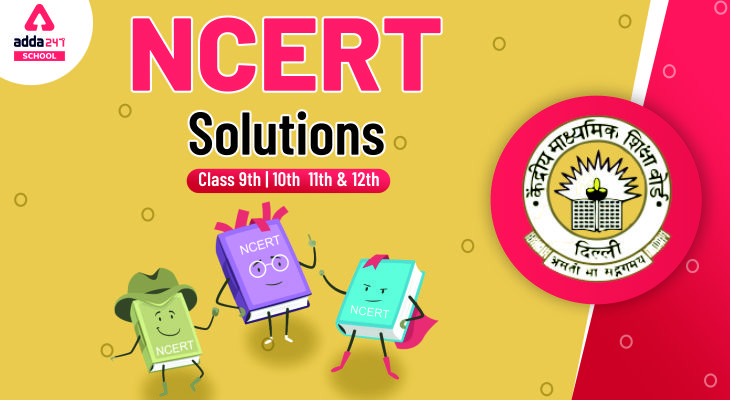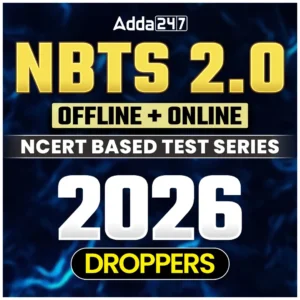
In Class 12, Chemistry is an important subject and scoring subject for science stream students. To do well in the board exam, as well as to clear the basic concepts, NCERT Solutions for Class 12 Chemistry is very important. NCERT is the standard book of reference to learn the foundation of chemistry. Keeping this in mind, Adda247 subject experts have provided a detailed solution of all the chapters-wise NCERT books for the upcoming board examinations and other competitive examinations like NEET and JEE. Download and practice the class 12 chemistry NCERT solutions 2024-25 for free from this page.
NCERT Solutions Class 12 Chemistry
The NCERT Solutions for Class 12 necessitate a lot of topics around chemical reactions, equations, and structures. Students can prepare their chapter and then venture the questions at the end of each chapter to prepare for exams. NCERT Solutions are prepared by subject experts to bestow a helping hand in solving the textbook questions. The target of these NCERT Solutions is to direct individuals towards problem problem-solving master plan, rather than solving problems in one stipulated format.
NCERT Chemistry Class 12 Syllabus Unit Wise
Check out the unit-wise class 12 NCERT book syllabus and the marks distribution of each chapter.
| Units | Unit Names | Marks |
| 1 | Solutions | 7 |
| 2 | Electrochemistry | 9 |
| 3 | Chemical Kinetics | 7 |
| 4 | d -and f -Block Elements | 7 |
| 5 | Coordination Compounds | 7 |
| 6 | Haloalkanes and Haloarenes | 6 |
| 7 | Alcohols, Phenols and Ethers | 6 |
| 8 | Aldehydes, Ketones and Carboxylic Acids | 8 |
| 9 | Amines | 6 |
| 10 | Biomolecules | 7 |
|
PRACTICALS
Volumetric Analysis (08) + Salt Analysis (08) + Content-based Experiment (06) + Project Work (04) + Class Record and Viva (04) |
30 | |
| TOTAL | 100 |
Class 12 Chemistry NCERT Solutions 2024-25 Free PDF Download
The PDF solutions with standard explanations have been provided below for students. Students will be able to score good marks by going through the solutions provided below.
| Class 12 chemistry NCERT solutions 2024-25 with Chapter-wise PDF Download |
NCERT Chemistry Solutions Class 12 Notes Pdf Download
The solutions class 12 chemistry in pdf notes pdf format is provided in this article. But rather than that students must also know some details about each chapter in the Chemistry class 12 syllabus.
Unit 1 Solutions
A solution is a mixture of two or more components. This chapter helps students to understand the concentration of solutions, types of solutions, the vapor pressure of liquid solutions, solubility of gases and solids in a liquid, ideal and non-ideal solutions, Rand aoult’s Law. Various problems based on finding the molarity, mole fraction, mass percentage and Henry’s Law constant are also present here.
Unit 2 Electrochemistry
This chapter deals with the electrochemical cell. Students also learn about the galvanic cell and electrolytic cell. The chapter explains the standard potential of the cell, the Gibbs energy of cell reaction, and the relation with the equilibrium constant. The students will learn the Kohlrausch Law and its applications.
Unit 3 Chemical Kinetics
Unit 3 of Class 12 Chemistry talks about chemical kinetics and the rate of a reaction in detail, the Arrhenius equation, and the dependence on the rate of reaction. The chapter also mentions factors affecting the rate of a reaction, the integrated rate equation, pseudo-first-order reactions, and the collision theory of chemical reactions.
Unit 4 The d and f Block Elements
The elements that lie between the s and p-block elements are called d-block or transition elements. The inner transition series are called f-block elements. This chapter introduces concepts such as the general properties of transition elements, variations in the ionic and atomic size of transition metals, physical properties, ionization enthalpies, magnetic properties, and oxidation states. Students will get a clear idea about the electronic configuration, general characteristics, and properties of important compounds in the chapter.
Unit 5 Coordination Compounds
The compounds dealt with here, are relatively and the concepts are novel, and therefore the students are required to pay special attention to the chapter. The chapter explains Werner’s theory of Coordination compounds, Bonding in Coordination compounds, Nomenclature, Isomerism, and others.
Unit 6 Haloalkanes and Haloarenes
In chapter 10 of the Class 12 Chemistry NCERT textbook, students get to learn the concepts of the IUPAC nomenclature of Haloalkanes and Haloarenes. Applications of organometallic reactions, preparation of haloalkanes and haloarenes, and stereochemistry are also prominent topics.
Unit 7 Alcohols, Phenols, and Ethers
The classifications of alcohols and phenols are based on the number of –OH groups present. Compounds that have one –OH group are called monohydride alcohols and phenols. The compounds that have two, three, or more –OH groups are called dihydric, trihydric or polyhydric alcohols and phenols. Students will study the reactions involved in the process of making alcohols of making alcohols from phenols, alcohols, and ethers. It will also help students to learn about the physical properties of alcohols, phenols, and ethers.
Unit 8 Aldehydes, Ketones and Carboxylic Acids
The next ones in lines are the aldehydes, ketones, and carboxylic acids. IUPAC names, to start with, the chapter explores their preparation methods, the key reactions, characteristics tests, and other properties.
Unit 9 Amine
The amines section covers organic compounds in hormones, proteins, alkaloids, vitamins, etc. The solutions to questions like IUPAC names of amines, identifying the primary, secondary, and tertiary amines, etc. are provided.
Unit 10 Biomolecules
The biomolecules section covers critical topics like monosaccharides, the hydrolysis product of sucrose and lactose, differentiating starch from cellulose, and secondary proteins.
Benefits of ADDA247 NCERT Solutions for Class 12 Chemistry
Practicing these NCERT solutions notes of chemistry is very effective for comprehensive board exam preparation. These NCERT notes come with many advantages, read here –
- In-depth knowledge of each chapter
- We focus on providing knowledge and concepts to students
- Step-by-step solution of each problem along with detailed video
- Each solution and chapter is first approved by our Subject Matter Experts and only then updated
- Free PDF and videos on our YouTube channel for Classes 1 – 12.
Why you should read Ncert Solutions For Class 12 Chemistry?
Get Conceptual Clarity of Each Chapter
- Class 12 Chemistry NCERT Solutions is an important subject as it contains many chemical reactions and problems which are of more marks when it comes to board exams. To distinguish the equations and chemical formulas, solving the NCERT chemistry class 12 PDF can be handy.
- The solutions offered by Adda247 are available in easily downloadable PDF format.
- Students can refer to the chemistry class 12 Solutions for referring to better solutions for each chapter of class 12 chemistry syllabus. The NCERT Solutions contains the explanation for each reaction so that it will be easier for the students while preparing for the board exams.
- Students will also be able to revise the chapters and recollect them easily while answering the complex questions in the exams.
- NCERT Solutions Class 12 Chemistry is an important subject as it contains many chemical reactions and problems which carry more marks when it comes to board exams. To distinguish the equations and chemical formulas, solving the NCERT can be handy.
NCERT Solution Class 12 Chemistry Prepared by Best Subject Matter
- We have some of the best subject matter experts in our panel who decide and approve each chapter-wise solution before they are uploaded onto the site. These experts have years of experience in their respective fields.
- Our content is carefully curetted as we understand the psychology of students and we make sure that students can easily comprehend every solution by making it simpler and easier to solve.
- Adda247 provides accurate and reliable information that is verified by Chemistry teachers. There is a whole team dedicated to making content along with revising and updating as per the views of our experts.
Chapter-wise Free PDF notes with videos
- At Adda247 we provide chapter-wise notes which are explained with detailed analysis. We make our notes by noting each sub-topic of a chapter so that students can easily understand the concept behind each chapter.




















